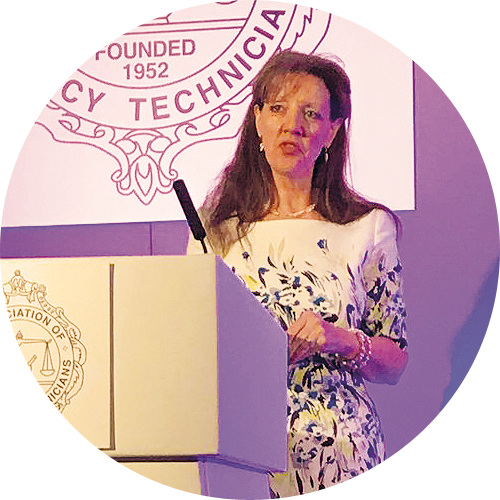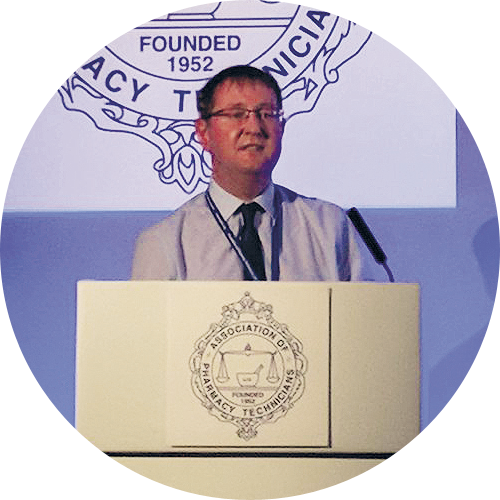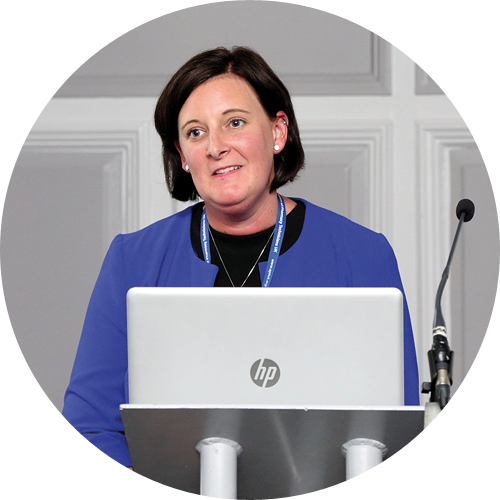APTUK 2018 Conference
In Opinion
Follow this topic
Bookmark
Record learning outcomes
Patient safety was the theme underpinning two days of discussion and debate at the 62nd Association of Pharmacy Technicians UK conference in Glasgow
Achieving excellence
 In her keynote address, Dr Rose Marie Parr, chief pharmaceutical officer for Scotland, discussed her plans to make Scotland the safest place for patients to be taking medicines, based on the 2017 strategy document – ‘Achieving excellence in pharmaceutical care’.
In her keynote address, Dr Rose Marie Parr, chief pharmaceutical officer for Scotland, discussed her plans to make Scotland the safest place for patients to be taking medicines, based on the 2017 strategy document – ‘Achieving excellence in pharmaceutical care’.
The document aims to achieve safe, effective, person-centred care across Scotland, and sets out the priorities, commitments and actions for improving and integrating pharmacy and pharmacy services in Scotland to increase clinical capacity and keep people well and safe from harm.
“Our vision is for pharmacy as an integral and enhanced part of a modern NHS in Scotland,” Dr Parr explained. “The plan for me is taking medicines and making them safer for people in Scotland; making Scotland the safest place for patients to be taking medicines.”
Empowering technicians
 “Patient safety is everyone’s business, it’s not just a pharmacist’s responsibility,” John McAnaw, chair of the Royal Pharmaceutical Society (RPS)’s Scottish Pharmacy Board, told delegates. And, he added, there are plenty of opportunities to empower pharmacy technicians and for their role to be further developed to support the patient safety agenda.
“Patient safety is everyone’s business, it’s not just a pharmacist’s responsibility,” John McAnaw, chair of the Royal Pharmaceutical Society (RPS)’s Scottish Pharmacy Board, told delegates. And, he added, there are plenty of opportunities to empower pharmacy technicians and for their role to be further developed to support the patient safety agenda.
Mr McAnaw highlighted the need for responsible pharmacists to look more closely at what responsibilities they can delegate to pharmacy technicians, saying: “What we need to do is encourage pharmacists to look at when, where and how authority can be safely delegated to free up their time to provide clinical care.”
Turning his attention to the topic of rebalancing, Mr McAnaw commented that it “really has the potential to empower the [pharmacy technician] profession” and urged delegates to read the consultation on responsible and superintendent pharmacists, as “it may have an impact on your future”.
Mr McAnaw closed by championing pharmacy technicians’ potential, saying: “We need to tackle the fear factor around professional empowerment. That’s going to be one of the challenges moving forward and the RPS is committed to looking at how we can get more out of pharmacy technicians and make them feel valued.”
Be open and honest
 “Patient safety is evolving in community pharmacy and should be a priority for everyone,” Caroline Boyle, professional and regulatory business partner at Well, told delegates.
“Patient safety is evolving in community pharmacy and should be a priority for everyone,” Caroline Boyle, professional and regulatory business partner at Well, told delegates.
She explained the importance of understanding that patient safety encompasses more than just dispensing. “People need to look and see that everything they do in their working day and in their activities is about patient safety. It can include giving incorrect OTC advice, providing the wrong services, safeguarding, near misses, handing out incidents, not responding to recalls and alerts, break downs in communication,” Ms Boyle explained. “We’re making sure we widen this message that it’s not just about dispensing – it’s about every single thing we do day to day.”
Ms Boyle highlighted the need for pharmacy to get away from a culture of blame and encourage open and honest communication so that errors start to be reported more often and lessons can be learned. Ms Boyle concluded with two pieces of advice for delegates: “Remember to think about the person behind the prescription and when something goes wrong, report it.”
Revalidation under the microscope
 “Do you know who your peer will be?” was the question Os Ammar, the General Pharmaceutical Council (GPhC)’s head of revalidation, put to delegates.
“Do you know who your peer will be?” was the question Os Ammar, the General Pharmaceutical Council (GPhC)’s head of revalidation, put to delegates.
Mr Ammar urged pharmacy technicians to start thinking ahead and plan for revalidation – pick a peer, identify knowledge gaps, become familiar with the new standards and plan CPD entries.
“Only you can choose your peer,” he said. “Pick the peer that is right for you at that point in your profession. It’s going to take time to think about it, establish that relationship and prepare for that relationship.”
Mr Ammar highlighted the importance of reflection in driving improvement of professional competencies and how the new approach aims to support pharmacy professionals in doing this. “The old model did try to [encourage reflection] but perhaps wasn’t as effective as it could have been. It tried to record reflections in quite a mechanistic way but actually it’s very personalised,” he said. “Different people will approach revalidation differently. The most important thing is that it’s the most useful methodology for you.”
In brief
APTUK president Tess Fenn opened the conference by commenting that five to 10 per cent of all hospital admissions are medicines related and with two-thirds of those being preventable, there’s a huge opportunity for pharmacy technicians to do more.
![]()
“When selling an OTC product, you need to ask the right question at the right time and know why you’re asking,” said Babir Malik, Weldricks teacher practitioner, University of Bradford, during his community pharmacy OTC update session. He added: “WWHAM is for pharmacy assistants, you should
be doing more.”
![]()
“Supervision is a massive hot potato in pharmacy at the moment,” said Oliver Jones, APTUK’s business development officer. Asking delegates whether they were in favour of updating legislation to enable some level of pharmacy technician supervision, Mr Jones was met with an almost unanimous yes. It was made clear by delegates however, that pharmacy technicians would want further training and that it may not be a responsibility suitable for everyone.
![]()
The Centre for Postgraduate Pharmacy Education (CPPE), one of 13 exhibitors at the conference, promoted their Accuracy Checking Pharmacy Technician Programme – a 12-month funded course for pharmacy technicians working in community pharmacy designed to develop leadership skills and drive quality services to improve patient health. This is now available to all pharmacy technicians across England.
After four years in the top job, Tess Fenn announced her intention to step down as APTUK president at the Association’s annual conference. Here, she speaks to TM about her decision...
